Please read this blog and advise (leave a message) if you’d like VM Productions to consider creating an adaptation of Fyodor & Polina’s story, either as a period play or a contemporary adventure taking place in Los Angeles (in the framework of our Dostoyevsky-LA Project) See more info below. Thanks.
When it came to women, Fyodor Dostoevsky immersed himself into dark, turbulent waters. Publicly, he often gave the impression of being an insufferable misogynist, intolerant of the growing women’s rights movement, but his writing about women belies that. A fool for love, Dostoevsky married twice, and conducted at least five extra-marital affairs. His most passionate affair was with writer Polina Suslova, in whom he found inspiration for many of his female characters. Her influence is evident in:
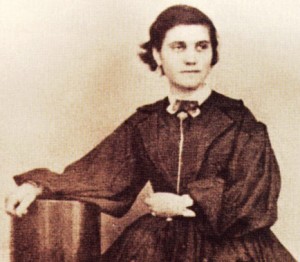
~Polina in The Gambler
~Nastasya Filipovna in The Idiot
~Katerina Ivanovna Marmeladova in Crime and Punishment
~Lizaveta Nikolaevna in The Possessed
~Katerina and Grushenka in The Brothers Karamazov
So, who was this woman who infused him with such fierce passion?
Her full name was Apollinaria Prokofyevna Suslova, born in 1839 in Panino, Nizhny Novgorod Governorate. Polina’s father, Prokofiy Suslov, had been a servant of the Sheremetevs, a great noble Russian family, but he possessed the strength of character and determination to progress from this humble beginning to become a successful merchant and manufacturer. He wanted to provide a decent education for his two daughters, employing a governess, and a private dancing teacher. Polina’s sister, Nadezhda Suslova, was to become Russia’s first female physician, while Polina was drawn to the Arts. She attended a finishing school, and when the family moved to Saint Petersburg, she attended the Saint Petersburg State University. She enjoyed the political struggle, the demonstrations, and students’ meetings. She was sympathetic to the radical views of that time, especially regarding women rights.
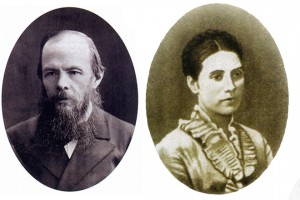 |
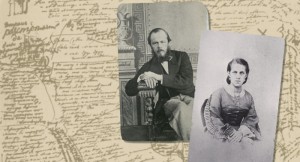 |
Polina was a fairly successful short story writer. Her better-known works include a short story, Pokuda, published in Mikhail Dostoyevsky’s Vremya magazine in 1861, Do Svadby (1863), and the autobiographical Chuzhaya i Svoy, published in 1928. Parts of her diary were published alongside Dostoevsky’s The Gambler.
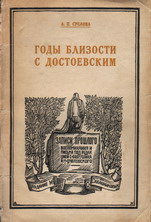 |
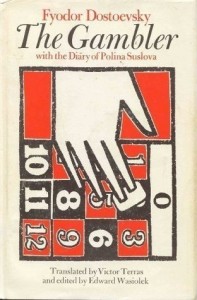 |
In 1861, Suslova attended classes taught by Fyodor Dostoyevsky, already a famous writer, whose lectures were very popular among young people. At that time, Dostoyevsky was 40, and she was 21. At Dostoevsky’s suggestion, they met secretly in Paris in August 1963, sealing their addictive relationship. They shared an unquenchable passion for literature and sex.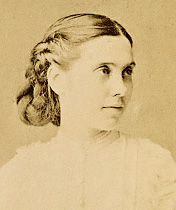
Dostoevsky’s daughter, Lyubov Dostoyevskaya, (who was born several years later, well after the affair had come to an end) did not like Polina, and insisted that she “spun around Dostoevsky and tried to please him in every way, but Dostoevsky did not notice her. Then she wrote him a love letter”. Another version is that Suslova brought her writings to Dostoyevsky and asked for advice. Her story was bad, but Dostoyevsky was attracted to a beautiful young girl and promised to teach her writing. Yet another explanation is that Dostoyevsky had read Suslova’s story, liked it and wanted to meet the author.
The relationship was difficult and painful for both sides, but mostly for Dostoyevsky. Their intimate affair peaked in 1862–63. Suslova’s dalliance with a Spanish student, Salvador, in late spring and Dostoyevsky’s gambling addiction ended their relationship. It is also believed that Polina had grown uncomfortable with the age gap between them. Polina had travelled with Dostoevsky during his period of addiction to gambling, and had experienced the man during some of his darkest, wildest times.
Suslova was undoubtedly the woman who hurt Dostoevsky the most. According to Marc Slonim: “He winced while calling her name, he was in communication with her while married; he always depicted her in his novels. Until his death he remembered her caress and slaps in the face. He was devoted to this seductive, cruel, unfaithful and tragic love.”
Extract from The Dostoevsky Archive: Firsthand Accounts of the Novelist from Contemporaries’ Memoirs and Rare Periodicals by Peter Sekirin
Polina Suslova: The Years of my Intimacy with Dostoevsky
August 19, 1863
I just received a letter from Fyodor Mikhailovich. He will arrive in several days…
August 27, 1863
As soon as I wrote these lines in my diary, FM arrived. I saw him through the window…
“I thought that you wouldn’t come because I had written a letter to you,” I said.
“Which letter?”
“The letter in which I asked you not to come here.”
“Why?”
“Because it is all over.”
He lowered his head, “I must know everything. Let us go somewhere and you will tell me everything, otherwise I will die.” I suggested going to his place…
When we entered his room, he fell on his knees at my feet and started to cry, to embrace and to press my knees, screaming: “I have lost you, I knew it!” A bit later he became more quiet, and he started to ask me who the man was. “He may be young, handsome and a good speaker. But, nevertheless, you will never find a heart as true as mine.” I did not want to speak for a long time.
“Did you surrender to him completely?”
“Why do you ask this? It is not good to ask such things,” I said.
“Oh, Polina, I do not know what is good and what is bad. Who is he: a Russian? A Frenchman? Is he my doctor?”
“No, no.” I told him that I was deeply in love with this man.
“Are you happy?”
“No.”
“How can this possibly be? You are in love and you are not happy. How can this be?”
“He does not love me.”
“He does not love you!” he cried out, clutching his head with both his hands in despair.
October 27, 1865
I received a letter from Fyodor yesterday. He had been gambling and lost everything. He asked me to send him some money.
September 15, 1866
People talk to me about Fyodor Mikhailovich. I simply hate him. He has caused me so much suffering. Especially when one considers that it could have been avoided. I see clearly now that I cannot fall in love again, I cannot find happiness in the pleasures of love, because the tenderness of men will always remind me of my former insults and suffering.
Something new could distract me from these thoughts though…
Dostoevsky was exhausted by work, poor health, and increasing financial worries. Polina Suslova was imperious, manipulative, jealous, and she constantly demanded that he divorce his “consumptive wife” Maria Isayeva. Dostoyevsky later noted that she was “a sick selfish woman”, whose “selfishness and self-esteem were colossal” and who did not tolerate any imperfection in other people. After Maria’s death in 1865, he proposed to Polina, but she declined.
It is reported that Polina rarely read his books, did not respect his work, and regarded him as a simple admirer. Dostoyevsky wrote to her once: “My dear, I am not inviting you to a cheap essential happiness.” After their breakup, she burned the compromising papers, including their letters. In 1867, Fyodor Dostoyevsky married Anna Snitkina.
He later described Polina in a letter to Nadezhda Suslova as a “great egoist. Her egoism and her vanity are colossal. She demands everything of other people, all the perfections, and does not pardon the slightest imperfection in the light of other qualities that one may possess”, and later stated “I still love her, but I do not want to love her any more. She doesn’t deserve this love …”
Lyubov Dostoyevskaya, in Dostoyevsky as Portrayed by His Daughter, described Polina as a young provincial woman, whose “rich relatives were able to send her enough money to live comfortably in Saint Petersburg. Every Autumn she entered the University as a student, but she never actually studied or passed any exams. However, she attended lectures, flirted with the students, made them sign petitions, participated in all political demonstrations, sang La Marseillaise, scolded the Cossacks and behaved provocatively.”
Polina later married Vasily Rozanov, one of the most controversial Russian writers and philosophers of the pre-revolutionary epoch. He met her when he was a schoolboy, when she was already over thirty years old. He fell in love at first sight. Rozanov had known her as the former mistress of Fyodor Dostoyevsky. It was enough to spark his interest, because Dostoyevsky was the writer whom he admired most. So obsessed was Rozanov, that he frequently referred to himself as Dostoyevsky’s “Underground Man”. Rozanov made only a brief entry in his diary: “Meeting Apollinaria Prokofyevna Suslova. My love for her! Suslova loves me, and I love her very much. She is the most wonderful woman I’ve ever met.” They conducted a love affair for three years, and eventually married in November 1880. She was 40 at that time, and he was just 24.
They parted in 1886. Their life together was torturous for Rozanov, as evident from his personal correspondence. Suslova made public scenes of jealousy and flirted with his friends at the same time. Rozanov’s daughter, Tatyana, stated in her memoirs: “Suslova mocked him, saying that what he was writing were just some stupid books; she insulted him, and finally dumped him.” Suslova broke up with Rozanov twice, but he always forgave her and begged to return home. After they finally parted, Rozanov admitted: “There was something brilliant (in her temperament) that made me love her blindly and timidly despite all the suffering.”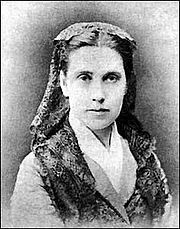
Ever the femme fatale, after Rozanov met his future wife, Varvara, Polina refused to divorce him for twenty years.
From the early 1900s, Polina Suslova lived alone in Sevastopol. There is little evidence to show how she conducted herself during these twilight years, but it is probably inevitable that she continued to mystify and torture hapless admirers. She died alone in 1918 at the age of 78.
References:
The Dostoevsky Archive: Firsthand Accounts of the Novelist from Contemporaries’ Memoirs and Rare Periodicals by Peter Sekirin
Dostoevsky: Turbulent in love as well as life, Russia Beyond, Jul 29, 2015 by Victoria Drey
Wikipaedia- Polina Suslova
Three Loves of Dostoevsky– Marc SlonimWant to know about VM Productions’ “Dostoyevsky-Los Angeles Project” and about the films we make? Want to participate in our projects? Sign up to get tickets to the premiere of our movie (currently in post production), Dostoyevsky Reimagined-BTS and grab our FREE e-books ! Follow this developing story through our social media on Twitter, Facebook, Google+, Pinterest, Tumblr, Instagram, Goodreads.
Follow this developing story through our social media on Twitter, Facebook, Google+, Pinterest, Tumblr, Instagram, Goodreads.
 |
 |

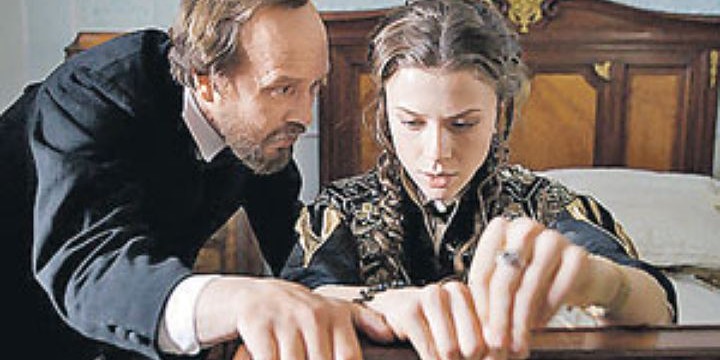
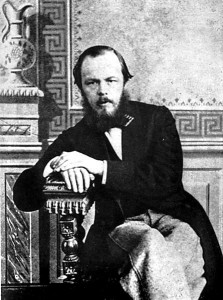
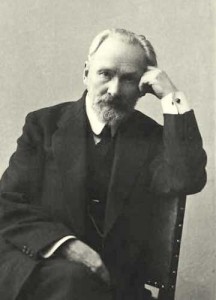
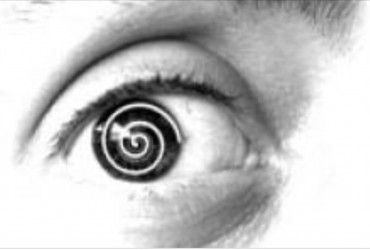
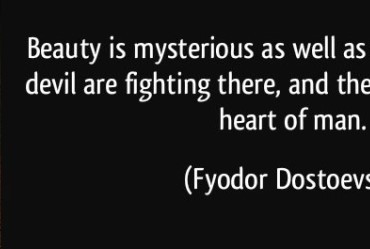



Leave a Reply